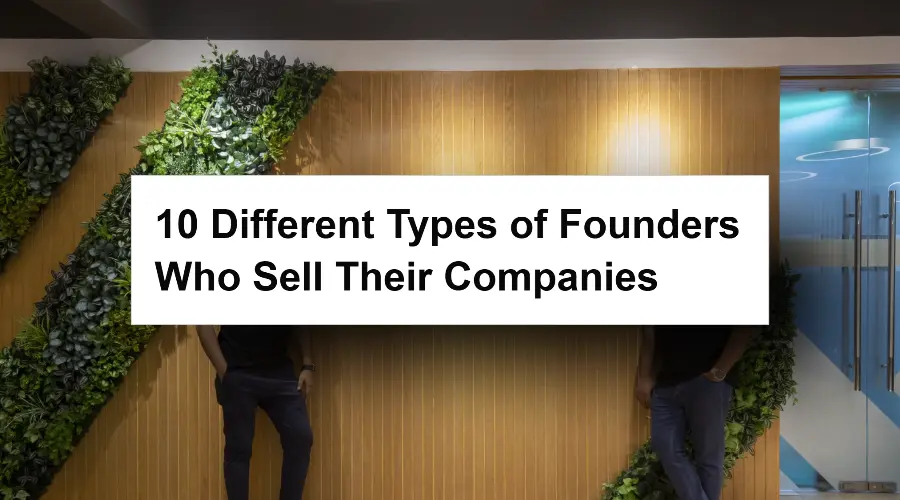10 Different Types of Founders Who Sell Their Companies

Selling a company is one of the most significant decisions a founder can make. It is not just a financial transaction, it is often the culmination of years of hard work, sacrifice, and vision. After running Mabya for the last 15 years, we know that not all founders sell for the same reasons. In fact, the motivations behind selling a business can vary dramatically depending on the founder's goals, circumstances, and mindset.
In this blog post, we will explore the different types of founders who sell their companies, from the strategic masterminds to the accidental sellers and beyond. Whether you are a founder considering an exit or a buyer looking to understand seller motivations, this breakdown will provide valuable insights.
1. The Strategic Seller
This founder is a chess player. The have been planning for an acquisition from day one, carefully positioning their company to attract the right buyers. They understand the market, know how to optimize their business for valuation, and time their exit perfectly. Strategic Sellers often have a clear vision of their post-sale life, whether it is starting a new venture, investing, or retiring.
Key Takeaway: If you are a Strategic Seller, your preparation and timing can maximize your exit value. For buyers, these founders often offer well-structured, attractive deals.
2. The Accidental Seller
Sometimes, selling a business isn't part of the plan until it is. The Accidental Seller builds something great, and out of the blue, an offer arrives. They weren't actively looking to sell, but the deal makes sense. Maybe the acquirer is a perfect fit, or the offer is too good to pass up.
Key Takeaway: For Accidental Sellers, it is important to evaluate offers objectively. Buyers should highlight synergies and long-term benefits to win these founders over.
3. The Burnt-Out Seller
Running a business is exhausting, and for some founders, the passion fades. The Burnt-Out Seller is tired, stuck, or simply ready to move on. When an offer comes, they take it often under pressure and sometimes for less than the company's true worth.
Key Takeaway: If you are feeling burnt out, consider seeking advice to avoid undervaluing your business. Buyers should approach these founders with empathy and fair offers.
4. The Legacy Seller
For some founders, their business is more than just a company it iss a legacy. The Legacy Seller might be a family business owner or a founder who has poured decades into their work. They sell to ensure the company's future, often prioritizing the right buyer over the highest bidder.
Key Takeaway: Legacy Sellers value alignment and long-term vision. Buyers should emphasize how they will preserve and grow the company's legacy.
5. The Opportunistic Seller
This founder is all about timing. They build companies with the explicit goal of selling during market peaks or hype cycles. The Opportunistic Seller prioritizes rapid growth and exit over long-term sustainability, often cashing out when valuations are high.
Key Takeaway: Opportunistic Sellers thrive in hot markets. Buyers should be cautious of overpaying during these cycles.
6. The Forced Seller
Sometimes, external forces like market downturns, regulatory changes, or investor pressure push founders to sell. The Forced Seller doesn't have the luxury of waiting for the right offer, which can lead to undervaluation.
Key Takeaway: Forced Sellers need to act quickly but should still seek fair terms. Buyers can capitalize on these opportunities but should aim for win-win deals. If you are a this unpleasant position and have to sell your company, consider selling it on Mabya in a time-limited auction, to get the best price for your business.
7. The Mission-Driven Seller
For this founder, the sale is about more than money, it is about accomplishing a mission. Whether it is sustainability, social impact, or innovation, the Mission-Driven Seller seeks a buyer who shares their values and can amplify their vision.
Key Takeaway: Mission alignment is critical for these sellers. Buyers should demonstrate how they’ll further the founder’s goals.
8. The Serial Seller
This founder is a repeat entrepreneur who builds companies to sell them. They thrive on the startup phase and use the proceeds to fund their next venture. For the Serial Seller, the business is a product, not a legacy.
Key Takeaway: Serial Sellers are pragmatic and experienced. Buyers can expect well-prepared deals but should be ready for tough negotiations.
9. The Partner-Pressured Seller
Co-founder disputes, investor demands, or shareholder conflicts can force a founder to sell. The Partner-Pressured Seller often feels caught between competing interests, leading to difficult decisions.
Key Takeaway: Clear communication and mediation can help these sellers navigate complex dynamics. Buyers should be mindful of underlying tensions.
10. The Retirement Seller
As founders near retirement age, selling becomes a natural step. The Retirement Seller prioritizes financial security and a smooth transition, often structuring deals to include advisory roles or phased exits.
Key Takeaway: Retirement Sellers value stability and trust. Buyers should emphasize a seamless handover and fair terms.
Final Thoughts
No two founders are alike, and neither are their exits. Understanding the motivations behind a sale can help both sellers and buyers navigate the process more effectively. Whether you are a founder planning your next move or a buyer looking to acquire a startup, recognizing these archetypes can lead to better outcomes for everyone involved.
As a founder you should be prepared to sell your business from day one. This means you should document everything, you should separate your personal costs and expenses from the costs and expenses of your business, because even if selling is not an option for you, sometimes you have to sell and you will get a better price if you are well prepared.
» Kevin Rose and Alexis Team to bring back Digg.com
» Why Polish Founders Should Sell Their Startups on Mabya